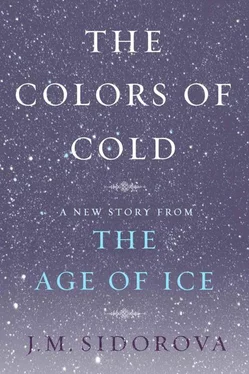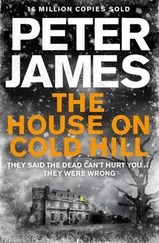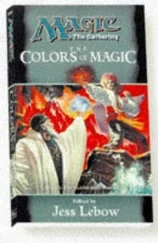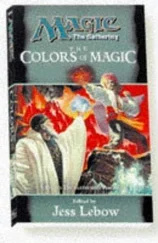Looking at our stepmother’s back and then at my brother’s sharp profile, a revelation washed over me. The something important that existed had given itself freely to Andrei and spared none for me. That’s why I wanted, needed to be with him: as if he were my interpreter, my guide. Without him, I could stray off into a strange and sad land, misunderstanding and misunderstood, unable to grasp why a motherless boy freezes, ceases play, when faced with a tableau of maternal love.
Then the moment of acuity passed. I nudged Andrei’s sleeve again. Without a word, he went back in.
When twilight set in he was making his fire. He blew on coals till he was dizzy, then fed in some dry pine needles, then wood chips, then twigs, then logs. And more logs. I begged him to stop but he would not. My cheeks burned, my forehead ached. Heat and smoke and shrapnel of glowing cinders beat us all the way to the snow walls, and still Andrei tossed more fuel into the fire, and the flames were about to outgrow our chamber.
We fled. Through the window slit the blaze shone like a giant magic lantern, orange through dusky blue; it was beautiful in its doom. Andrei whooped when the roof collapsed, and laughed in shrill, compulsive volleys when the flames hissed, dying under the weight of snow. He still laughed when a manservant ran to us from the mansion with a dispatch for us to go indoors at once, and he went eagerly, circling around the man, poking him in the arm, asking Did you see? and heaping upon the man a story of how he’d burned down the ice palace.
I dragged behind them. I wasn’t angry at Andrei. I was sad.
* * *
When we turned twelve, Andrei begged to be sent to the Cadet Corps in St. Petersburg and our father gave his blessing. Twenty-five years of service were mandatory to sons of nobility back then, and those who eschewed it were forced to append a humiliating appellation to their signature— Juvenile —for life. Still, we did not have to start so young. All I knew was that Andrei longed to leave home. The reason? It had to have come from the same place as his impulse to burn down the ice palace. Still, If he goes, I go, I told Father. He did not object.
By the time we were sixteen, I had learned to drift dispassionately along in the regimented life of the Corps, while Andrei was brimming with ambitions. He longed to join the elite Leib Guard, praetorians of the “Third Rome” (as the Russian Empire liked to call herself). He wearied himself with training: throwing cast-iron balls as far as he could or hanging from a crossbar with a weight fastened to his legs in order to stretch himself taller. In this manner he strove and I drifted, each of us coming into manhood and taking the shapes that belied our kinship: my hair darkened, his paled. I bolted, tall and long-armed; he settled on an average height, broad in the shoulders. My features arranged themselves handsomely; his came together in a pleasant but ordinary visage.
On graduation day a pole was installed in the exercise court. High up on the pole, a notch was chipped, the proverbial cut. Chickens came scratching around the pole as we queued up opposite it. When it was his turn, Andrei all but took his heels off the ground to make the cut, but alas. “Too short. Next!” the corporal droned. When stepping away, Andrei kicked at a chicken, drawing snickers from everyone present. He blushed and fled. My turn came next and I stepped in and out fast: I was in a rush to find Andrei. Of course I was tall enough.
I found him at the edge of the grounds; he sat in the grass, wrestling a burr off his stocking. I hovered over him and offered what I thought was the only, the best consolation. “I’d rather go with you than be a Leib Guard.” Picking viciously at the crumbling burr, my brother replied, “You’re stupid. You don’t know what it means to be a Guard.” He struck a chord: indeed the Leib Guard’s appeal did not penetrate me, which could be considered dimness rather than indifference. I felt slighted, yet still I tried: “I mean, because of you and me—not the Guard.”
Andrei sprang from the ground. “Leave me alone!”
He pushed me out of his way and was ambling off when I released my frustration. “You picked the wrong mother,” I said. “Should’ve stuck with Avdotia—would’ve grown tall.”
He spun around, furious.
I said to his face, “Your Italian did you no good.”
He measured me. “Get out of my life.”
I could not help noticing that the remnants of the burr still clung to his left stocking as he stomped off. I stood; wasn’t I like that burr, I thought. I called his name but he kept going.
* * *
I hoped that this upset would pass as others had, but Andrei repelled my overtures as days at the Cadets dwindled. They assigned him to the Novgorod Musketeers. I wrote to our father begging him to intercede—to help get Andrei into the Guard. I had no idea whether Father had enough weight to accomplish it. By November, Andrei was back at the home estate in Moscow, while I moved just across the Neva, to the Preobrazhensky Leib Guard barracks, and waited to be sworn in. In December a letter from Father said Andrei was leaving, and not even for Novgorod but much farther away—for Smolensk. “That is the way your brother wants it,” Father wrote.
Meanwhile, the day of my swearing-in ceremony drew near. My mind told me to enjoy myself, but my heart ticked with anxiety: the moment of irreversibility would be fast upon me unless I did something.
So I ran. One night in December I hit the St. Petersburg–Moscow road as befit a distraught youth: no kibitka, no coachman, no blankets, only my mount, borrowed from my second uncle in St. Petersburg. The loaner horse bolted an hour into the journey, and I was thrown out of the saddle; when I rose to my feet I became aware of the formidable silence of the winter fields. Just a few lights of human habitation twinkled miles ahead of me, the light of the world divided between stars, the moon, and the snow. There was a stillness in the night, a majestic calm of cold that seemed to know that it could overpower any disturbance—rushing hearts and thoughts, scurrying of warm creatures and fluttering of warm molecules.
My horse stopped a few yards away from me, steaming and jerking her hide under the saddle. It was a coat that had startled her—discarded or lost by a traveler. Balled up in snow, it resembled a crouching beast. The horse neighed, fearful—she seemed to understand the peril of the snowy world. I, too, felt a pang of fear—or awe, rather, the kind that freezes one in place. In order to dispel the feeling I took my glove off and picked up a handful of snow. I squeezed my hand into a fist, then opened it, and let the snow fall out of my palm.
The snow I had squeezed didn’t melt. Dry, solid flakes went into my bare palm and dry flakes sifted out, sparkling and twirling as they fell to the ground.
My first thought—after a flash of sheer primal wonderment—was how I’d tell my brother about it. I did not believe my eyes, I’d say, and I did not, or rather believed just enough to make a story out of it, the excitement, the urgency of which would help me close the gap between us. Hokum, he’d challenge me, prove it . We would run out to the yard, and then—
I crouched and scooped another handful of snow. This is how I’d prove it . I opened my palm—and beheld the snow melting. It was as if my brother and I had just grown even farther apart.
I felt a wet nudge to the back of my head. My impatient horse. “Teasing me, right? Fooling me,” I said to the snowy fields. I looked forward, then back. Then mounted and rode on toward Moscow. I stopped at the next transit lodge to wait out the night. Come morning I was on the road again.
Читать дальше












